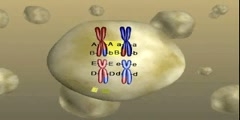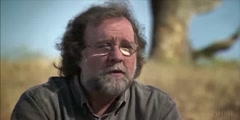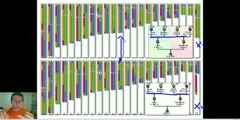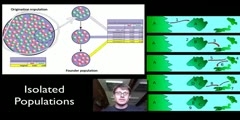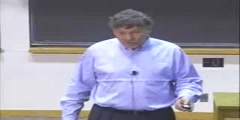Lec 5 - How Selection Changes the Genetic Composition of Population
"Lec 5 - How Selection Changes the Genetic Composition of Population" Principles of Evolution, Ecology and Behavior (EEB 122) Genetics controls evolution. There are four major genetic systems, which are combinations of sexual/asexual and haploid/diploid. In all genetic systems, adaptive genetic change tends to start out slow, accelerate in the middle, and occur slowly at the end. Asexual haploids can change the fastest, while sexual diploids usually change the slowest. Gene frequencies in large populations only change if the population undergoes selection. 00:00 - Chapter 1. Introduction 05:45 - Chapter 2. History of Genetics 10:57 - Chapter 3. Different Genetic Systems 20:45 - Chapter 4. Math of Genetics 40:42 - Chapter 5. Rates of Change in Different Genetic Types Complete course materials are available at the Open Yale Courses website: http://open.yale.edu/courses This course was recorded in Spring 2009.
Video is embedded from external source so embedding is not available.
Video is embedded from external source so download is not available.
Channels: Ecology
Tags: genetics gene frequencies heterozygous homozygous Hardy-Weinberg sexual asexual haploid diploid selection evolutionary rates meiosis genetic disease dominance heritability
Uploaded by: yaleevoeco ( Send Message ) on 02-09-2012.
Duration: 49m 31s
Here is the next lecture for this course
Lec 6 - The Origin and Maintenance of Gen ...
48:15 | 3611 viewsMechanism Behind Genetic Diversity
01:38 | 10975 viewsLec 21 - Biology 1B - Sexual Selection
49:05 | 3072 viewsLec 13 - Sexual Selection
46:07 | 4981 viewsLec 14 - Public Health 250A - Lecture 15: ...
51:10 | 2759 viewsLec 20 - Biology 1B - Lecture 21: Sexual ...
49:58 | 3802 viewsNatural Selection in Humans
14:04 | 38256 viewsExplanation of Recombination Frequencies ...
12:07 | 7482 viewsWhat is genetic drift ?
11:28 | 3747 viewsGenomics Lecture MIT
49:06 | 23447 viewsBioethics Of Human Genetic Engineering - ...
06:53 | 29272 viewsLec 21- Sexual Selection
47:57 | 2901 viewsGenetic Drift
00:28 | 8722 viewsLec 4 - Genetic Engineering (cont.)
51:44 | 5617 viewsLec 4 - Neutral Evolution: Genetic Drift
44:03 | 3912 viewsNo content is added to this lecture.
This video is a part of a lecture series from of Yale
Lecture list for this course
Lec 1 - The Nature of Evolution: Selection, Inheritance, and History
Lec 2 - Basic Transmission Genetics
Lec 3 - Adaptive Evolution: Natural Selection
Lec 4 - Neutral Evolution: Genetic Drift
Lec 6 - The Origin and Maintenance of Genetic Variation
Lec 7 - The Importance of Development in Evolution
Lec 8 - The Expression of Variation: Reaction Norms
Lec 11 - Life History Evolution
Lec 14 - Species and Speciation
Lec 15 - Phylogeny and Systematics
Lec 16 - Comparative Methods: Trees, Maps, and Traits
Lec 17 - Key Events in Evolution
Lec 18 - Major Events in the Geological Theatre
Lec 19 - The Fossil Record and Life's History
Lec 21 - Evolutionary Medicine
Lec 22 - The Impact of Evolutionary Thought on the Social Sciences
Lec 24 - Climate and the Distribution of Life on Earth
Lec 25 - Interactions with the Physical Environment
Lec 26 - Population Growth: Density Effects
Lec 27 - Interspecific Competition
Lec 28 - Ecological Communities
Lec 29 - Island Biogeography and Invasive Species
Lec 30 - Energy and Matter in Ecosystems
Lec 31 - Why So Many Species? The Factors Affecting Biodiversity
Lec 32 - Economic Decisions for the Foraging Individual
Lec 33 - Evolutionary Game Theory: Fighting and Contests
Lec 34 - Mating Systems and Parental Care

